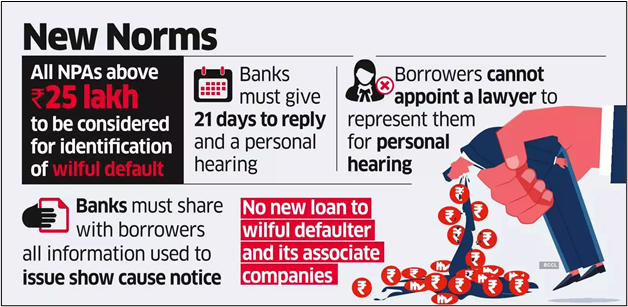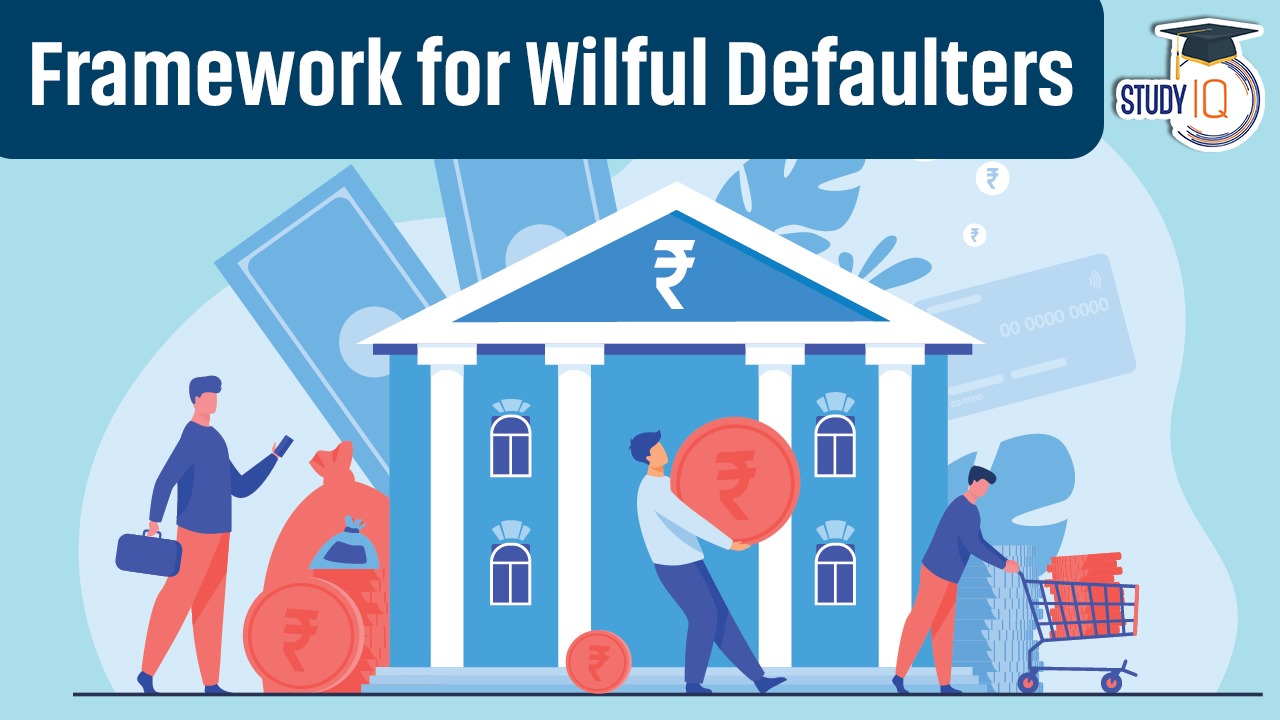Table of Contents
Context: The Reserve Bank of India (RBI) released a Master Direction on the treatment of wilful defaulters.
Framework for Wilful Defaulters
- Objective:
- Establish a transparent and non-discriminatory procedure for classifying borrowers as wilful defaulters
- Disseminate credit information about wilful defaulters to caution lenders against extending further finance to them
- Applicability:
- Effective 90 days from publication
- This applies to all commercial banks, cooperative banks, financial institutions, non-banking financial companies (NBFCs), asset reconstruction companies (ARCs), and credit information companies (CICs)
- Restrictions on further financial accommodations extend to all RBI-regulated entities

- Reporting Requirements:
- Lenders must report wilful defaulters to Credit Information Companies (CICs)
- Responsibility for accurate reporting lies with the lender
- Lenders must cross-check information with relevant databases (e.g., Registrar of Companies)
- Specific guidelines for reporting settled cases, defaulted loans sold to other lenders or ARCs, and accounts resolved under IBC or other frameworks
- Preventive Measures:
- Lenders must implement robust credit appraisal systems
- Monitor end-use of funds
- Scrutinise quarterly progress reports
- Conduct regular inspection of borrowers’ assets
- Perform periodic management audits
- Role of Auditors:
- Critical in detecting and preventing wilful defaults
- Lenders must report negligent auditors to the National Financial Reporting Authority (NFRA) or the Institute of Chartered Accountants of India (ICAI)
What Is Wilful Defaulter?
As per RBI guidelines, a wilful default occurs when a borrower (a person or company) misuses borrowed funds, diverting them from their intended purpose, syphoning off money, or disposing of assets securing a term loan without the lender’s knowledge.
Consequences of Being Declared a Wilful Defaulter
- Credit Access Restrictions:
- Ineligibility to borrow from any financial institution.
- Complete shutdown of access to credit channels.
- Impediment to New Ventures:
- Inability to secure institutional finance for starting new businesses for a period of five years.
- Hindrance to entrepreneurial initiatives.
- Legal Implications:
- Lenders have the option to initiate criminal action against the defaulter.
- Potential legal consequences for the borrower.
- Reporting to Credit Information Companies:
- Banks are obligated to provide a list of wilful defaulters with outstanding loan balances exceeding ₹25 lakh (where suits have been filed) to credit information companies such as CIBIL, Experian, Equifax, and High Mark at the end of each quarter.
- Reporting includes the names of current directors and directors associated with the company when the borrower was declared a defaulter.
- This reporting can deter potential lenders from extending credit to the individual or entity.


 Out-of-Pocket Health Expenditure, Reason...
Out-of-Pocket Health Expenditure, Reason...
 Treasury Bills (T-bills): RBI Cuts Holdi...
Treasury Bills (T-bills): RBI Cuts Holdi...
 Fisheries Sector in India, Current Statu...
Fisheries Sector in India, Current Statu...

























